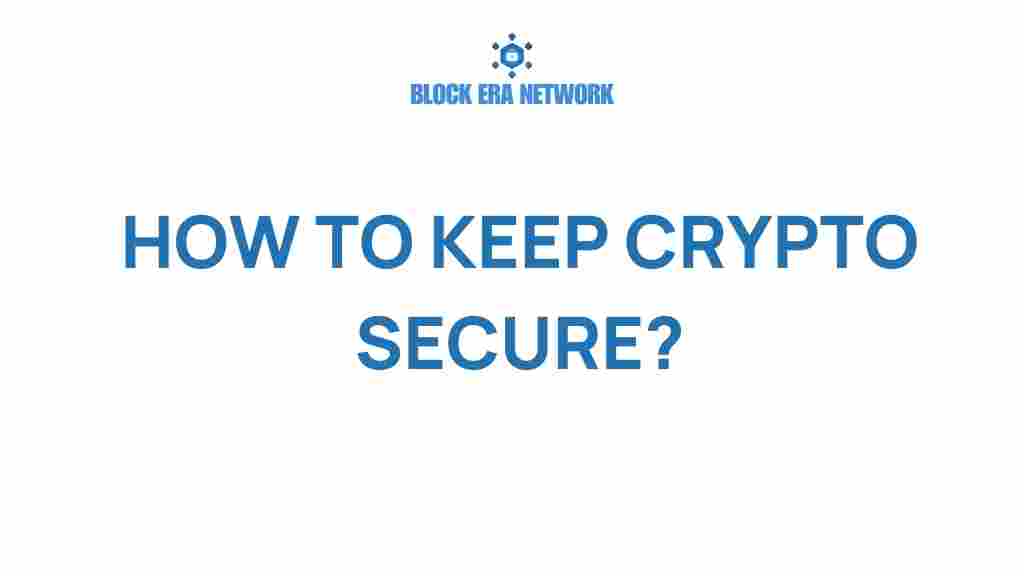Unlocking the Secrets: How to Keep Your Crypto Secure
In the rapidly evolving world of digital assets, ensuring crypto security is more crucial than ever. As investors and enthusiasts embrace cryptocurrencies, they must also be vigilant about protecting their investments. This comprehensive guide will delve into various strategies and best practices to keep your digital assets secure, focusing on safe storage, blockchain protection, private keys, and more.
Understanding Crypto Security
Crypto security involves a series of practices and technologies designed to protect your cryptocurrencies from theft, loss, and fraud. With the increasing number of phishing scams and hacking attempts, it is essential to understand the fundamentals of securing your digital wealth.
The Importance of Safe Storage
One of the first steps in ensuring crypto security is choosing the right storage solution for your digital assets. There are several options available:
- Hot Wallets: These are online wallets connected to the internet, making them convenient for frequent transactions but more vulnerable to hacking.
- Cold Wallets: These are offline storage solutions, such as hardware wallets, which provide enhanced security by keeping your private keys away from the internet.
- Paper Wallets: A physical printout of your public and private keys, which can be stored in a safe place. This option is immune to online threats but can be lost or damaged easily.
Blockchain Protection Techniques
Securing your cryptocurrencies also involves understanding the blockchain technology that underpins them. Here are some key methods:
- Use Strong Passwords: Always create complex passwords for your wallets and accounts. Avoid using easily guessable information.
- Enable Two-Factor Authentication: This adds an extra layer of protection by requiring a second form of verification, such as a code sent to your mobile device.
- Regular Software Updates: Keeping your wallet software and any related applications up to date helps protect against vulnerabilities.
Private Keys: The Heart of Crypto Security
Your private keys are crucial for accessing your digital assets. Losing them means losing access to your funds. Here are some tips for managing your private keys:
- Do Not Share Your Private Keys: Treat your private keys like your bank account information. Never share them with anyone.
- Backup Your Keys: Keep a secure backup of your private keys in a safe location, away from your primary storage.
- Use Multi-Signature Wallets: These wallets require multiple keys to authorize a transaction, adding an extra layer of security.
Defending Against Phishing Scams
Phishing scams are a significant threat in the crypto space. Here’s how you can protect yourself:
- Verify URLs: Always double-check the URLs of websites you are visiting. Ensure they are legitimate and secure.
- Be Wary of Emails: Avoid clicking on links in unsolicited emails. Always go directly to the website by typing the URL into your browser.
- Educate Yourself: Stay informed about common phishing tactics and scams to recognize suspicious activity.
Wallet Safety Best Practices
Ensuring your wallet’s safety is paramount in protecting your digital assets. Here are essential practices:
- Choose Reputable Wallets: Use wallets that have been reviewed positively by the community and have a proven track record of security.
- Regularly Monitor Transactions: Keep an eye on your wallet for any unauthorized transactions. Report any suspicious activity immediately.
- Limit the Amount in Hot Wallets: Only keep a small amount of cryptocurrency in hot wallets for daily transactions; store the bulk in cold wallets.
Step-by-Step Process for Securing Your Crypto
To effectively secure your crypto investments, follow this step-by-step process:
- Choose the Right Wallet: Evaluate your needs (trading frequency, amount of crypto held) and select a wallet type that suits your security preferences.
- Secure Your Private Keys: Store your private keys in a secure, offline location. Consider using a hardware wallet for added security.
- Enable Two-Factor Authentication: Activate 2FA on all crypto accounts and wallets to enhance security.
- Educate Yourself on Phishing: Familiarize yourself with phishing tactics and learn how to identify potential scams.
- Regularly Update Security Measures: Keep your wallet software updated and review your security practices periodically.
Troubleshooting Security Issues
Even with the best precautions, issues may arise. Here are some troubleshooting tips:
- Lost Access to Wallet: If you lose access, try recovery options provided by the wallet service. Always keep your recovery phrase secure.
- Unauthorized Transactions: Immediately report any unauthorized transactions to your wallet provider and consider moving your funds to a new wallet.
- Phishing Suspicion: If you suspect a phishing attempt, report it to the relevant authorities and educate others about the scam.
Conclusion: Your Role in Crypto Security
Maintaining crypto security is not just the responsibility of wallet providers but also a personal commitment by every investor and user in the crypto space. By following these guidelines and remaining vigilant, you can protect your digital assets from theft and fraud. Remember to regularly reassess your security measures as the landscape of threats evolves. For more information on securing your assets, check out this detailed resource. Stay informed, stay safe, and enjoy your cryptocurrency journey!
This article is in the category Crypto Security and created by Block Era Network Team
